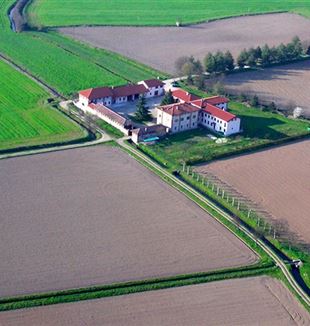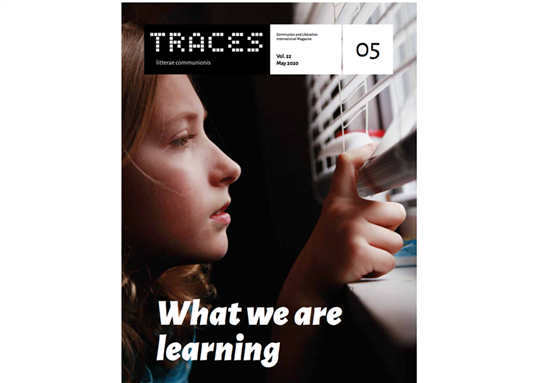
A continuous “Here I am”
From the May issue of Traces, Fr. Sergio Massalongo, the prior of the Cascinazza monastery, explains how in his experience “our yes to Christ is, before all else, our contribution to the salvation of every man and woman today.”"Prodesse omnibus cupientes”. This is how St. Stephen Harding described to his fellow monks that very human need to contribute to the good of all people 900 years ago in the Carta Caritatis (the governing document of the Cistercian Order). The coronavirus–with all the drama it has brought with it–has powerfully highlighted that need.
Just contributing, however, is not enough. Those three Latin words, in fact, go much deeper: how can one benefit mankind from within the four walls to which almost all of us are now relegated? How can shared life in close quarters, our children’s homework, “smart working,” and the inability to see and touch loved ones suffering in hospital beds all be tools useful for the good of all people? In his March 12th letter to Communion and Liberation, Fr. Julián Carrón pointed out the way: “Our yes to Christ, including in the isolation each of us may be forced to maintain, is, before all else, our contribution to the salvation of every man and woman today.”
We spoke over the phone at the door of Cascinazza, a Benedictine monastery just outside of Milan, with people who live their whole lives between four walls and, in their apparent hiddenness, “bear witness that the Lord is victorious by their very existence,” as Fr. Giussani wrote about the place in 1996. “For me, being in a monastery is not the working out of some idea I have of perfecting myself, but rather my response to His call. It is a continuous, ‘Here I am,’” said Fr. Sergio Massalongo, the monastery’s prior.
Fr. Sergio, how can a person who is now forced to stay at home, sometimes alone, contribute to the good of the world in this concrete situation, in the mundanity of doing everyday things?
First and foremost it must be remembered that the nature of one’s vocation is not being a monk, or an employee, or a housewife, etc., but is, rather, following Christ in the form of life he chooses for me: “Let me be what you want me to be.” That response to his call summarizes the purpose of our life, our personal contribution toward helping every person truly find him or herself, and if it is true for me, it is true for everyone. There is a story from the Desert Fathers (4th century) in which a young monk, after a time of particular trial, goes to the elder and tells him he does not think he can continue and would like to go home. The elder replied, “Remember that, when you came here, the Lord carried you. If you leave now, you go alone.” That is, the Lord may lead us into the desert or nail us to the four walls of our house, he may bring us through the most bitter trials, but he is always with us and never abandons us. His presence is our strength. If instead I want to manage life myself, I am at my own mercy and no longer know how I will end up. I feel imprisoned, exhausted, and dissatisfied despite having what I want. In a nutshell, what most defines my identity are not all the choices I make, but the fact that Jesus chose me, that he loves me and I am his. This is powerful–not even the evil I do or the sins I commit are an objection for God. I can deny or refuse him, but I cannot erase the fact that he has chosen me, that he loves me. This is what gives me certainty and an indomitable hope that I can begin again.
What does it mean for you monks to say yes to your circumstances in every moment?
It means being open to the Mystery and to the ways he is knocking at my door, on his own terms, this very instant. Saying yes to him means allowing him to enter my present situation through the poverty of my flesh, that he might transform reality and make it more true. We have been called to be instruments of his glory in the world. Just as Our Lady’s yes brought Christ into the world, so our poor but daily yes to what is asked of us contributes to the salvation of the world.
What helps you to live in this way?
Three things: first, following the objective word spoken by the church and those who live by that word. Second, accepting the conditions of the sacrifice the Lord allows us to experience: the sacrifice of being nailed to the four walls of our house just as he was nailed to the four poles of the cross. And third, seeing the example of my brothers who live with me in the monastery.
Silence and prayer. The church suggests that these become dimensions of life for everyone. Why should a person desire silence, though? It seems to be merely a lack of noise...
What I desire is not silence; I desire Christ, and Christ is someone who is present and imposes himself. This generates wonder and silence in me; he is a presence I look to and follow. Christ can be present in the noise and chaos of a big city, in a hospital full of sick people (as we see now), or as we muck the stables. The point is that when you catch him in action, you feel how your own actions are loved, liberated, and constructive because they are taken in collaboration with his design. It is easier to recognize his voice in a silence that is full of the memory of him. But this is not the memory of Christ that I imagine, the fruit of my good intentions. Silence is true to the degree that its content is the word Christ speaks to me so that I may change; it therefore involves a dynamic obedience, a continuous position of listening and adapting my will to his. It is identifying myself with him. His word makes an all-encompassing demand on my life, and the real work is in following what was said to me to the letter. Do we understand the point of what he says, the only place worth a commitment of our whole life? What authoritative word has been spoken to you, what has a supreme value that can direct your life? If we don’t know, or if we are confused about this, our silence is a deafening emptiness, and we feel the need to distract ourselves with useless appearances. The truth of the content of our silence, then, brings up the questions: Who is the authority for you? Yourself, or an Other? Who are you following? To what are you responding?
The Cistercian abbot general Fr. Mauro-Giuseppe Lepori, in a letter dated March 15th, cites Psalm 45: “Be still and know that I am God.” These words have a differ- ent ring these days, now that the whole world has been stopped in its tracks. But what does it mean to “be still” before His presence? And what can help teach us to do so?
Where do I recognize how he is present to me? In the place the Lord has put me, in the monastery and in the movement. It’s inside these things that you need to “be still” and watch where and how he is present; these are the only places to truly find direction amidst an in nite network of voices and opinions. During this time of the pandemic, having to close our gates turns our gaze inward to the life of the house in order to rediscover its value and how we have already been given everything. In a meeting of the community, one of my confreres said, “This circumstance challenges us to verify the kind of companionship we really need. We do not even have the mailman’s face as a pretext for turning our focus outside the monastery walls. Either it’s true that I can meet Christ here, in the 21 faces given to me, or my being is founded on something that is ultimately a lie... Is Christ enough or not? Because if He is not enough for us, even if you don’t get the virus, you might as well be dead.” This time of trial, then, can be approached as a favorable opportunity rather than an objection, as a resource for allowing ourselves catch the “contagion” of the communion of Christ among us, which transforms our small space into a house of God; this is the way in which he wants to build up our monastery right now. Paradoxically, the time of exile we are living through is the means by which all things, reclaimed from distraction, regain their true significance; they go back to their origin, the place where the other next to me assumes his true face.
Many people have been touched by pain. How can they “embrace the hardships so as to embrace the cross of Christ,” as the Pope suggested in St. Peter’s Square on March 27th?
In describing the fourth step of humility in his Rule, St. Benedict advises monks going through any kind of trial or suffering to begin by silently embracing patient suffering in their hearts as if that patience were a person one could embrace. Ultimately it is Christ whom we embrace in our trials so that he may sustain us. Only those who have personally experienced suffering are capable of compassion, “suffering with” one’s brothers and sisters, which is the greatest form of love. Another saying from the Desert Fathers provides that “Each must make his own anything that happens to his neighbor; must suffer with him in every trial, weep with him, and feel as if they are one and the same body; he must experience the same amount of tribulation as his brother who has been struck by trials, as it is written: ‘We are one body in Christ’ (Rm 12:5), and ‘the community of believers was of one heart and mind,’ (Acts 4:32).” Only that which is converted into our own suffering can be converted into love. It is only possible to em- brace the hardships and pain of humanity by looking to the sufferings of Christ; it is there that our own sufferings find meaning. During this period, we cannot be left indifferent to the cries of our suffering brothers and sisters; God is calling many people to offer a sacri ce so that we may become more true. If we do not respond to this call, all that is happening will be fruitless, seeming like mere chance. The suffering of others calls us to be ourselves.
Your life, at least as far as we can tell, has not undergone substantial change. What has your life been like during this time?
It’s true: except for being entirely cloistered, our common life inside the monastery continues as regularly as it did before. We are preparing the fields to be planted, and we are getting ready for other tasks as we usually do. Even the celebration of the liturgy remains the same. Everything is more dramatic, however. We are less distracted during our days and are helping each other listen to what the Lord wants to say to us through this circumstance. We are praying to him for all the intentions that come to us in various ways from near and far, so that the Lord might take pity on us and bring this plague to an end.
Click here to read the May issue of Traces#Coronavirus